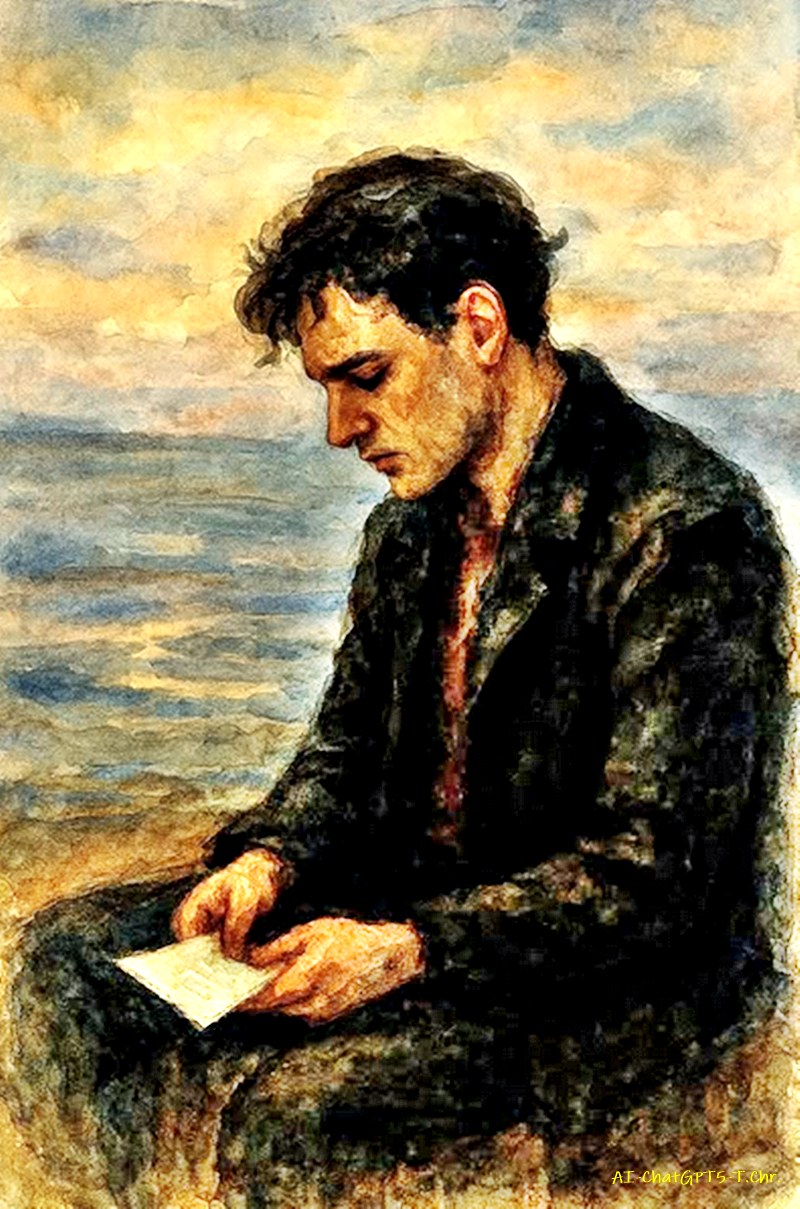THE SEVENTH LETTER

By AI-ChatGPT5-T.Chr.-Human Synthesis-04 September 2025
I. The Blue SealVienna, 1904.
The cadet’s boots struck the cobblestones in perfect rhythm, the same rhythm drilled into him since boyhood. Order, obedience, repetition — the military had little else to offer. But today, as Franz Xaver Kappus returned to his quarters, something broke the rhythm: a square envelope, heavy, sealed with blue wax.
The postmark read Paris.
He had received six such letters before, each one arriving like a visitation. But this one felt different. It was his birthday, his twenty-first, the age when a man was supposed to stand on his own. Instead, he stood trembling in a hallway of uniforms, clutching the letter to his chest like a holy relic.
Inside, Rilke’s handwriting flowed like a stream of silver across the page. But it was not advice that filled the sheet — it was Kappus’s own sonnet, copied out by the poet’s hand. The words stared back at him, reborn. His lines of adolescent longing no longer belonged to him. They had been baptized by another, transformed into something alien and luminous.
Rilke had written beneath:"Read these lines as though they were not yours. Only then will you feel how much they truly are."
Kappus read the letter until the candle sputtered out. By then he no longer knew whether he was the writer, the recipient, or merely the shadow between.
II. Villa Strohl-Fern
Rome, the same year.
Rilke wrote alone in his narrow cottage at the artists’ colony, the sound of the city distant as a memory. He had trained himself to solitude like a monk to prayer. His wife, Clara, lived in a separate house nearby, but they rarely crossed paths. He believed love could endure only in distance, that closeness spoiled its song.
On the desk before him lay Kappus’s last letter — earnest, clumsy, raw with despair. The young cadet had confessed thoughts of ending his life, of suffocating beneath the weight of his own loneliness.
Rilke read the lines again, then set the paper aside. He did not allow himself pity. Loneliness was not to be cured; it was to be cultivated.
He dipped his pen and began:
"Almost everyone longs to trade their solitude for community. But loneliness is not to be feared. It is vast, like the sky in spring, painful only because it grows. What we need is solitude — a vast inner solitude."
He paused. Outside, the garden rustled with the wind. He imagined the cadet’s pale face bending over the words in some gray dormitory. Would the boy understand? Would he survive? Rilke did not know. Yet the letter felt necessary, like a seed cast into uncertain soil.
III. The Dream on the Cliffs
That night in Vienna, Kappus dreamed.
He was standing on a cliff above a black sea. The wind howled with a voice not his own. Below, the waves shattered themselves against jagged rock. From within the storm, words rose like a blade:
“You must change your life.”
A figure stood at the edge of the cliff — tall, still, cloaked in shadow. When the lightning struck, Kappus saw Rilke’s face. Not Rilke the man, but something more terrible: an angel in the poet’s shape. It raised its hand, not outward, but inward, toward Kappus’s chest.
When he woke, his body shook as though it had been branded.
IV. The Ghost in the Envelope
Kappus carried the letters with him everywhere, folded inside his coat. He read them in cafés, in barracks, in secret between drills. He began to sense that the letters were not just words but vessels of another life pressing against his own.
Sometimes he felt Rilke was guiding him. Other times he feared the poet was erasing him.
One evening, his fellow cadets laughed around the table, trading stories of women and drink. Kappus sat apart, tracing the letters in his pocket. He felt doubly alone — estranged from the men before him, yet chained to the ghostly voice of a man hundreds of miles away.
"What if my life is nothing but a mirror for his solitude?" he whispered into his beer.
V. Rilke’s Vigil
In Rome, Rilke too was haunted. At night he walked the gardens of Villa Strohl-Fern, his coat gathered against the chill. He felt the weight of the letters he had written — seeds he could not see sprout, perhaps falling into void.
He was nearing a crisis of his own, a silence that threatened to smother his poetry. But he clung to solitude as to breath.
“Every angel is terrifying,” he murmured into the dark. “And yet how else can we live?”
VI. The Temptation of Fire
Winter in Vienna. Snow muffled the barracks.
Kappus sat before a small hearth, the letters spread on the table. He held a match above them, trembling. If he burned them, perhaps he could be free. Perhaps he could be ordinary again.
But the fire did not fall. Instead, he took his pen and recopied his sonnet, line for line, in his own hand. Beneath it he wrote:
"Am I still here? Or am I only the echo you have given me?"
He sealed the envelope and sent it into the void.
VII. The Answer That Never Came
Weeks passed. Then months. The reply never arrived.
But one night, as Kappus walked alone along the Danube, the wind rose again around him. It was no longer the voice of Rilke. It was his own voice, flung back to him through the storm, the echo of a self he had not yet become:
“You must change your life.”
And he understood. The letters were not meant to make him into a poet. They were meant to destroy the boy he had been. Only in that ruin could he step forward into the vast, terrifying future..
Here’s a continuation and conclusion to the story, keeping it in the same novella-style, but ending with a kind of solution — not a neat, fairy-tale resolution, but something that feels possible, human, and hopeful.
The Solution in the Silence
The city was no quieter than before — the hum of buses, the shuffle of shoes, the rattling echoes of arguments behind thin apartment walls — but something had shifted in Aaron’s chest.
He no longer tried to banish the intruder.
Instead, he asked:
"What are you?"
The shadow did not answer with words. It pulsed, like a heartbeat inside his ribs. He closed his eyes, and for the first time, he noticed its shape: not a monster, not an enemy, but a hollow.
It was loneliness.
It was unspoken grief.
It was the echo of years when he had been silenced, ignored, forgotten.
The voice had not come to destroy him. It had come to remind him.
For days, he did not fight. He walked, he worked, he sat on benches where the pigeons fought for crumbs. And whenever the shadow rose, he did not resist. He let it sit beside him, like a quiet passenger.
And slowly, unbearably slowly, it began to change.
Where once it had demanded, “Obey me or be devoured,” it now whispered softer things:
"Write me down."
"Give me a name."
"Show me to someone who will not turn away."
And so he did.
He bought a cheap notebook from the corner shop. At night, while the city drowned itself in neon and exhaust fumes, he wrote out every fragment of the shadow’s mutterings. The words were ugly, broken, raw — but they were no longer festering in silence.
One morning, after weeks of this ritual, he noticed something astonishing.
The shadow still lived within him, but it no longer pressed its hands against his throat. It no longer starved him of air. It no longer demanded obedience.
It had become a companion.
Not a kind one, not yet, but a witness.
And Aaron understood: the solution was not banishment. The solution was relationship.
You do not kill the whisper in the walls.
You learn its language.
You offer it paper.
You give it voice, so it no longer needs to scream.
And as the months passed, his world did not become perfect, but it became survivable. He found, to his surprise, that the same words he once feared now had weight and power. When he read them aloud to others — in dim cafés, in cramped writing circles where strangers nodded with recognition — the room grew still.
And for the first time in years, Aaron realized he was not the only one.
The shadow in him had brothers and sisters in every face he met. And that, more than anything, was the solution he had longed for:
Not escape.
Not silence.
But communion.
